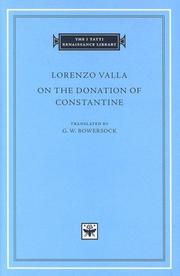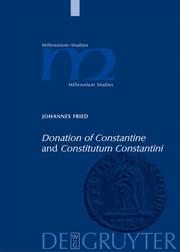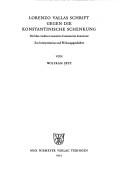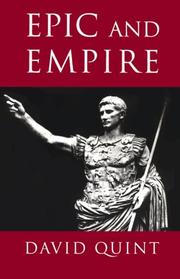| Listing 1 - 10 of 11 | << page >> |
Sort by
|
Book
Year: 1534 Publisher: [Imprynted at London : By Thomas Godfray [for William Marshall,
Abstract | Keywords | Export | Availability | Bookmark
 Loading...
Loading...Choose an application
- Reference Manager
- EndNote
- RefWorks (Direct export to RefWorks)
eebo-0018
Book
Year: 1621 Publisher: London : Printed by Bernard Alsop [and John Legat], for Iohn Teague, and are to besold [sic] at his shop in Pauls Church-yard, at the signe of the Golden-Ball,
Abstract | Keywords | Export | Availability | Bookmark
 Loading...
Loading...Choose an application
- Reference Manager
- EndNote
- RefWorks (Direct export to RefWorks)
eebo-0113

ISBN: 9780674025332 0674025334 Year: 2007 Volume: 24 Publisher: Cambridge, Mass.: Harvard university press,
Abstract | Keywords | Export | Availability | Bookmark
 Loading...
Loading...Choose an application
- Reference Manager
- EndNote
- RefWorks (Direct export to RefWorks)
Popes --- Papes --- Temporal power --- Early works to 1800. --- Pouvoir temporel --- Ouvrages avant 1800 --- Constitutum Constantini. --- Constitutum Constantini --- -Holy See --- See, Holy --- Papacy --- -Constitutum Constantini. --- Costituto di Costantino --- Donatio Constantini --- Donation of Constantine --- Donazione di Costantino --- Konstantinische Schenkung --- Privilegia sacerdotum --- -Temporal power --- Donation de Constantin. --- Popes - Temporal power - Early works to 1800
Book
ISSN: 11504129 ISBN: 2251339205 9782251339207 Year: 1993 Volume: 21 Publisher: Paris: Les Belles Lettres,
Abstract | Keywords | Export | Availability | Bookmark
 Loading...
Loading...Choose an application
- Reference Manager
- EndNote
- RefWorks (Direct export to RefWorks)
Donation of Constantine --- Donation de Constantin --- --Critique historique --- --Donation de Constantin --- --Forgery --- Constitutum Constantini. --- Church history --- Faux --- Eglise --- Histoire --- Forgery --- Critique historique --- VALLA (LORENZO), 1405-1457 --- HUMANISTES ITALIENS --- CONSTANTIN IER LE GRAND (FLAVIUS VALERIUS AURELIUS CLAUDIUS CONTANTINUS), ?-337 --- OEUVRES --- VALLA (LORENZO) --- DONATION --- EDITION CRITIQUE

ISBN: 9783110185393 3110185393 3110902230 9783110902235 3111809404 Year: 2007 Volume: Bd. 3 Publisher: Berlin ; New York : Walter de Gruyter,
Abstract | Keywords | Export | Availability | Bookmark
 Loading...
Loading...Choose an application
- Reference Manager
- EndNote
- RefWorks (Direct export to RefWorks)
Die Konstantinische Schenkung ist die ungeheuerlichste, wirkmächtigste Fälschung der Weltgeschichte. Allein die Frage nach ihrer Entstehungszeit beschäftigte Generationen von Wissenschaftlern. Was aber genau ist die Konstantinische Schenkung? Zur Beantwortung dieser Frage ist die Unterscheidung zweier semantischer Ebenen unerlässlich: zum einen das Constitutum Constantini, ein fiktives Privileg, in dem u.a. die der römischen Kirche von Kaiser Konstantin aus Dankbarkeit gewährten Rechte und Geschenke aufgeführt werden, zum anderen die Konstantinische Schenkung als ein sich seit der Mitte des 11. Jahrhunderts ausformendes Erinnerungsbild und Jedermannswissen. Nicht nur die Entstehung des Constitutum Constantini wird vom Autor völlig neu interpretiert, nämlich der fränkischen Opposition gegen Kaiser Ludwig den Frommen zugeschrieben, sondern auch die Geschichte seines bis in die Textimplantationen reichenden Missverständnisses seit dem Hohen Mittelalter dargestellt. Der Band enthält im Anhang alle relevanten Texte im Original und in englischer Übersetzung. The Donation of Constantine is the most outrageous and powerful forgery in world history. The question of its precise time of origin alone kept generations of researchers occupied. But, what exactly is the Donation of Constantine? To find the answer, it is necessary to approach the question on two different semantic levels: First, as the Constitutum Constantini, a fictitious privilege, in which, among other things, rights and presents were bestowed on the catholic church by a grateful Emperor Konstantin. Secondly, as a reflection of the Middle Age mindset, becoming part of the culture landscape midway through 11th century A.D. The author not only reinterprets the origin of this forgery (i.e. puts it down to the Franks' opposition of Emperor Louis the Pious), but retells, as well, the history of its misinterpretation since the High Middle Ages. In an appendix, all relevant texts are printed in the original language, an English translation is provided.
Church and state --- Rescripts (Roman law) --- Church history --- Eglise et Etat --- Rescrits --- Eglise --- History. --- Forgeries. --- Histoire --- Faux --- Constantine --- Constitutum Constantini. --- Roman law --- Constantijn, --- Constantin, --- Constantin --- Constantine, --- Constantino --- Constantinus Flavius Valerius Aurelius, --- Constantinus --- Constantinus, --- Costantino --- Costantino, --- Flaviĭ Valeriĭ Avreliĭ Konstantin, --- Flavius Valerius Aurelius Constantinus Augustus, --- Flavius Valerius Aurelius Constantinus, --- Flavius Valerius Constantinus, --- Konstantin, --- Konstantin --- Kōnstantinos, --- Kōnstantinos --- Konstantyn, --- Kostandianos --- Κωνσταντίνος, --- Флавий Валерий Аврелий Константин, --- Константин --- Константин, --- Flavije Valerije Konstantin --- Constitutum Constantini --- Costituto di Costantino --- Donatio Constantini --- Donation of Constantine --- Donazione di Costantino --- Konstantinische Schenkung --- Privilegia sacerdotum --- Donation of Constantine. --- Middle Ages. --- Donation dite de Constantin --- Constantin Ier (empereur romain ; 027.?-0337) --- Donation de Constantin --- Rescrits (droit romain) --- Europe --- Jusqu'à 1500 --- Constantin empereur
Book
ISBN: 9789004261969 9789004261976 Year: 2013 Volume: 172 Publisher: Boston Brill
Abstract | Keywords | Export | Availability | Bookmark
 Loading...
Loading...Choose an application
- Reference Manager
- EndNote
- RefWorks (Direct export to RefWorks)
Valla, Laurentius --- 873.4 VALLA, LAURENTIUS --- Humanistisch Latijnse literatuur--VALLA, LAURENTIUS --- 873.4 VALLA, LAURENTIUS Humanistisch Latijnse literatuur--VALLA, LAURENTIUS --- Popes --- Temporal power --- Thomas, --- Valla, Lorenzo, --- Akʻvineli, Tʻoma, --- Akvinietis, Tomas, --- Akvinskiĭ, Foma, --- Aquinas, --- Aquinas, Thomas, --- Foma, --- Thomas Aquinas, --- Tʻoma, --- Toma, --- Tomas, --- Tomasu, --- Tomasu, Akwinasu, --- Tomasz, --- Tommaso, --- Tʻovma, --- Тома, Аквінський, --- תומאס, --- תומס, --- اكويني ، توما --- Constitutum Constantini. --- Costituto di Costantino --- Donatio Constantini --- Donation of Constantine --- Donazione di Costantino --- Konstantinische Schenkung --- Privilegia sacerdotum --- Ākvīnās, Tūmās, --- اكويني، توما, --- آکويناس، توماس,
Book
ISBN: 8815097015 9788815097019 Year: 2004 Volume: 35 Publisher: Bologna: Il Mulino,
Abstract | Keywords | Export | Availability | Bookmark
 Loading...
Loading...Choose an application
- Reference Manager
- EndNote
- RefWorks (Direct export to RefWorks)
Church history --- Church and state --- Eglise --- Eglise et Etat --- History --- Histoire --- Constantinus, --- Donation of Constantine --- Italy --- Italie --- Histoire religieuse --- Catholic Church --- History. --- Constitutum Constantini. --- Christianity and state --- Separation of church and state --- State and church --- State, The --- Catholic Church&delete& --- Costituto di Costantino --- Donatio Constantini --- Donazione di Costantino --- Konstantinische Schenkung --- Privilegia sacerdotum --- Church and state - Catholic Church - History. --- Constantin empereur --- Donation dite de Constantin --- Constantine

ISBN: 3484800631 9783484800632 Year: 1975 Volume: 44 Publisher: Tübingen: Niemeyer,
Abstract | Keywords | Export | Availability | Bookmark
 Loading...
Loading...Choose an application
- Reference Manager
- EndNote
- RefWorks (Direct export to RefWorks)
Popes --- Temporal power --- Valla, Lorenzo, --- Constitutum Constantini --- -Holy See --- See, Holy --- Papacy --- Valla, Lorenzo --- -Temporal power --- Lorenzo della Valle --- Valensis, Laurentius --- Church and state --- Church history --- Temporal power of religious rulers --- Roman question --- Constitutum Constantini. --- Costituto di Costantino --- Donatio Constantini --- Donation of Constantine --- Donazione di Costantino --- Konstantinische Schenkung --- Privilegia sacerdotum --- Popes - Temporal power --- Valla, Lorenzo, - 1407-1457 - De falso credita et ementita Constantini donatione declamatio
Book
ISSN: 0540830X ISBN: 9783775210270 377521027X Year: 2011 Volume: 27 Publisher: Hannover: Hahn,
Abstract | Keywords | Export | Availability | Bookmark
 Loading...
Loading...Choose an application
- Reference Manager
- EndNote
- RefWorks (Direct export to RefWorks)
Providence and government of God --- Providence divine --- Early works to 1800. --- Ouvrages avant 1800 --- Constantine --- Constitutum Constantini --- Christianity --- Constantijn, --- Constantin, --- Constantin --- Constantine, --- Constantino --- Constantinus Flavius Valerius Aurelius, --- Constantinus --- Constantinus, --- Costantino --- Costantino, --- Flaviĭ Valeriĭ Avreliĭ Konstantin, --- Flavius Valerius Aurelius Constantinus Augustus, --- Flavius Valerius Aurelius Constantinus, --- Flavius Valerius Constantinus, --- Konstantin, --- Konstantin --- Kōnstantinos, --- Kōnstantinos --- Konstantyn, --- Kostandianos --- Κωνσταντίνος, --- Флавий Валерий Аврелий Константин, --- Константин --- Константин, --- Flavije Valerije Konstantin --- Costituto di Costantino --- Donatio Constantini --- Donation of Constantine --- Donazione di Costantino --- Konstantinische Schenkung --- Privilegia sacerdotum --- Providence and government of God - Christianity - Early works to 1800 --- Constantine - I, - Emperor of Rome, - d. 337 --- Pie ii (pape ; 1405-1464), dialogues

ISBN: 0691015201 0691069425 0691222959 Year: 1992 Publisher: Princeton, N.J. Princeton University Press
Abstract | Keywords | Export | Availability | Bookmark
 Loading...
Loading...Choose an application
- Reference Manager
- EndNote
- RefWorks (Direct export to RefWorks)
Alexander the Great, according to Plutarch, carried on his campaigns a copy of the Iliad, kept alongside a dagger; on a more pronounced ideological level, ancient Romans looked to the Aeneid as an argument for imperialism. In this major reinterpretation of epic poetry beginning with Virgil, David Quint explores the political context and meanings of key works in Western literature. He divides the history of the genre into two political traditions: the Virgilian epics of conquest and empire that take the victors' side (the Aeneid itself, Camoes's Lusíadas, Tasso's Gerusalemme liberata) and the countervailing epic of the defeated and of republican liberty (Lucan's Pharsalia, Ercilla's Araucana, and d'Aubigné's Les tragiques). These traditions produce opposing ideas of historical narrative: a linear, teleological narrative that belongs to the imperial conquerors, and an episodic and open-ended narrative identified with "romance," the story told of and by the defeated. Quint situates Paradise Lost and Paradise Regained within these rival traditions. He extends his political analysis to the scholarly revival of medieval epic in the late eighteenth and nineteenth centuries and to Sergei Eisenstein's epic film, Alexander Nevsky. Attending both to the topical contexts of individual poems and to the larger historical development of the epic genre, Epic and Empire provides new models for exploring the relationship between ideology and literary form.
Epic poetry --- Literary form. --- Literature and history. --- History and criticism. --- Genres [Letterkundige ] --- Genres [Literaire ] --- Genres littéraires --- Geschiedenis en literatuur --- Geschiedenis en poëzie --- Histoire et littérature --- Histoire et poésie --- Letterkundige genres --- Littérature et histoire --- Poésie et histoire --- Poëzie en geschiedenis --- Poetry --- History --- History and criticism --- Literature and history --- Literary form --- Politiek. --- Epiek. --- Epic poetry. --- 17.86 literary genres, theory of genre. --- Heroic poetry --- History and literature --- History and poetry --- Poetry and history --- Form, Literary --- Forms, Literary --- Forms of literature --- Genre (Literature) --- Genre, Literary --- Genres, Literary --- Genres of literature --- Literary forms --- Literary genetics --- Literary genres --- Literary types (Genres) --- Literature --- Acoma pueblo. --- Ahl, Frederick. --- Ancients and Modems. --- Ascoli Piceno. --- Barchiesi, Alessandro. --- Barlow, Joel. --- Bentley, Richard. --- Borges, Jorge Luis. --- Brecht, Bertolt. --- Brooks, Peter. --- Caesar, Julius. --- Caesarion. --- Carausius. --- Cicero. --- Cleanthes. --- Dias, Bartolomeu. --- Donation of Constantine. --- Duggan, Joseph. --- Eikon Basilike. --- Empson, William. --- Este family. --- Fawkes, Guy. --- Fowler, Alastair. --- Fronde. --- Getto, Giovanni. --- Guarini, Battista. --- Góis, Damião de. --- Hartman, Geoffrey. --- Herodotus. --- Horace. --- Jamestown settlement. --- Josephus. --- Kalevala. --- Lagos, Ramona. --- Leo X, Pope. --- Loyola, Ignatius. --- Martello, Francesco. --- Michel, Francisque. --- Moctezuma. --- Naevius. --- Napoleon Bonaparte. --- New Historicism. --- Onate, Juan de. --- Parthia and Parthians. --- Peisistratus. --- Polybius. --- Quintilian. --- anabaptism. --- census. --- civil war. --- history and narrative. --- imitation.
| Listing 1 - 10 of 11 | << page >> |
Sort by
|

 Search
Search Feedback
Feedback About UniCat
About UniCat  Help
Help News
News